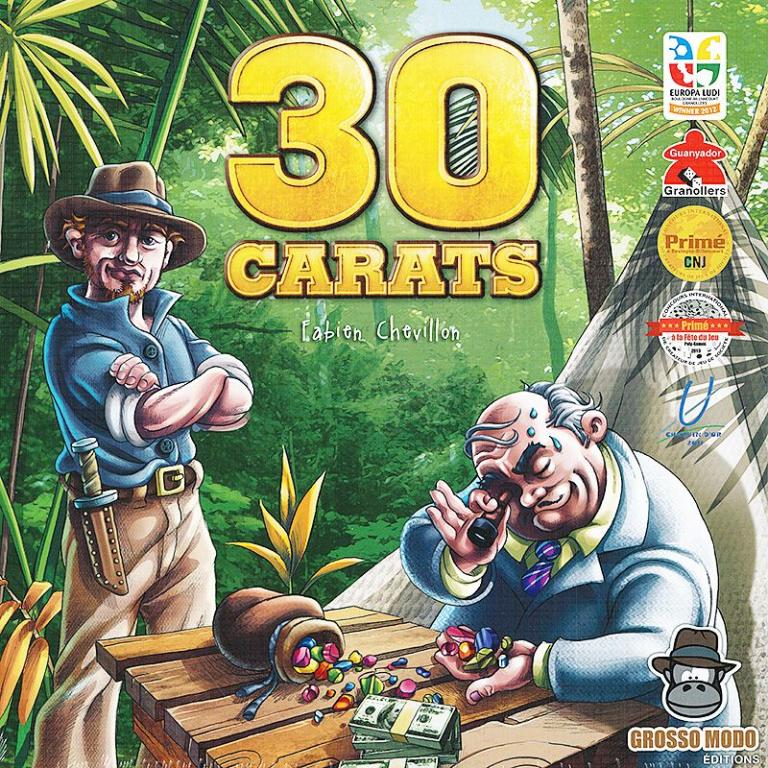30 Carats

30 Carats
Players in 30 Carats start with exactly the same items — a colored screen to hide their goods, five gemstones of each color in play, and five gold nuggets — but they won't stay the same for long! After all, each player receives a secret valuation card, ranging from +30 to -30, and the gemstones matching the color of his screen will have this value at the end of the game. (Gold nuggets are always +10 points.) Do you need to sell or buy your initial holdings? And how do you find out the value of everything else?!
Each player also starts the game with three transaction cards. Each transaction lists a minimum offer that a seller must make on his turn, e.g., at least two gems of his own color or one gem of his color and two gems of a neighbor's color.
The game lasts three rounds, labeled morning, midday and night. In each round, each player will be the seller once. The player chooses one of his transaction cards, then places an offer onto the table that at least matches the minimum offer required. If the transaction is labeled "simultaneous", each other player must simultaneously reveal an offer of his own, which must include at least one stone/nugget and must not match the seller's offer; if the transaction is "successively", each opponent reveals his offer in clockwise order. After seeing all of the offers, the seller either trades goods with an opponent or pays 2-4 nuggets to the bank in order to drop his offer into the bank bag (along with his nuggets), then draw that many items from the bag. (The bank bag starts with the same items as each player.)
In games with at least four players, the seller can pay 2-4 gold nuggets to the bank in order to look at the secret valuation card held by any opponent.
Once each player has been seller three times, the game ends and everyone reveals their valuation cards. Players then tally their scores, and the player with the highest total wins, with gold nuggets in hand breaking ties.
Each player also starts the game with three transaction cards. Each transaction lists a minimum offer that a seller must make on his turn, e.g., at least two gems of his own color or one gem of his color and two gems of a neighbor's color.
The game lasts three rounds, labeled morning, midday and night. In each round, each player will be the seller once. The player chooses one of his transaction cards, then places an offer onto the table that at least matches the minimum offer required. If the transaction is labeled "simultaneous", each other player must simultaneously reveal an offer of his own, which must include at least one stone/nugget and must not match the seller's offer; if the transaction is "successively", each opponent reveals his offer in clockwise order. After seeing all of the offers, the seller either trades goods with an opponent or pays 2-4 nuggets to the bank in order to drop his offer into the bank bag (along with his nuggets), then draw that many items from the bag. (The bank bag starts with the same items as each player.)
In games with at least four players, the seller can pay 2-4 gold nuggets to the bank in order to look at the secret valuation card held by any opponent.
Once each player has been seller three times, the game ends and everyone reveals their valuation cards. Players then tally their scores, and the player with the highest total wins, with gold nuggets in hand breaking ties.
Player Count
3
-
6
Playing Time
40
Age
9
Year Released
2013
Newest Review
Remote video URL